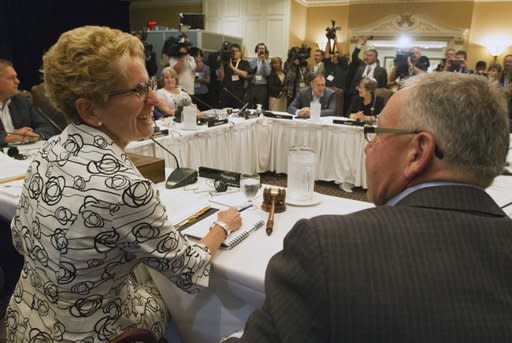 Canada Politics
Canada PoliticsDo we need a national inquiry into missing or murdered aboriginal women?
The Harper government is dismissing a call by Canada's premiers to hold a public inquiry into missing or murdered aboriginal women.
According to the Canadian Press, the Conservatives say that they've already taken important steps with regard to that issue.
A spokeswoman for Justice Minister Peter MacKay says the government has already taken concrete action, including passing legislation that gives women living on First Nations reserves access to emergency protection orders.
Paloma Aguilar says it has also provided new tools to law enforcement and worked to improve the justice system, such as creating a National Centre for Missing Persons.
She says the government will continue to work with the parliamentary committee that's currently studying the issue.
If you couple those comments with a quote from Prime Minister Harper, earlier this year, you would think the odds of an inquiry to are next to none.
"Not to say they never work or never produce good recommendations, but my experience has been, they almost always run way over time, way over budget and often, the recommendations prove to be of limited utility," Harper said last month during a trip to New York.
[ Related: Conservatives dismiss call for aboriginal women inquiry despite premiers' backing ]
It's easy for the provinces to offer their support, as they did on Wednesday, as part of their annual summer get-together. After all, the provinces don't have to put up any of the money for a national inquiry.
If it was up to the opposition parties and the provinces, however, we'd be flush with public inquiries right now.
The Green Party has asked for a Royal commission on the robo-call scandal while the Liberals have asked for a public inquiry on the Senate scandal.
Moreover, the government in Quebec has said that they haven't ruled-out the possibility of a public inquiry into the train disaster in Lac-Mégantic.
[ Related: MM&A working hard to play the heel in Lac-Megantic train derailment ]
Public inquiries are pretty darn expensive and, like Prime Minister Harper said, their outcomes can be mixed.
According to Postmedia News, the Royal Commission on Aboriginal Peoples in the 1990s cost taxpayers $60 million.
"It resulted in more than 400 recommendations and a 20-year plan to implement them," they noted, "but many of its major suggestions have gone unheeded."
[ Related: The future of First Nation relations: peace or strife? ]
Nobody is discounting the importance of this issue. The Native Women's Association of Canada told CBC News that they have documented over 600 cases of missing or murdered aboriginal women between 2005 and 2010. Those numbers require immediate action.
But don't we already know why so many Aboriginal women are going missing in this country?
The root problem is the poor economic lot of so many First Nations women — both on-reserve and off-reserve.
We also know the solutions: fairer funding models for health and education.
And, finally, policing organizations — across the country — need to be held to account for ignoring cases regarding missing Aboriginal women.
[ Related: Questions about First Nation unity abound as AFN kicks off annual meeting ]
Ernie Crey, whose missing sister's DNA was found on serial killer Willie Pickton's pig farm in Port Coquitlam, provides an alternative view.
In in an interview with Yahoo! Canada News, he says a national inquiry is worthwhile if it's done right with clear terms of references.
"I'm not interested in seeing a national inquiry into missing women, if it's just a recap of everything that's gone on that led to the impoverishment and dis-empowerment of aboriginal people," Crey, a policy adviser for the Stó:lō Tribal Council in British Columbia, said.
"What I'm interested in is a national inquiry that takes us to a place where we can up with a national strategy. What are specific things that we need to do in Canada to reduce the incidences of violence...and finally tackle the issue of what needs to be done to reduce the disappearance and deaths of so many aboriginal women."
Crey adds that he believes that it's possible that the prime minister will change his mind about an inquiry.
"I know what it's going to take to persuade him. [Harper is] going to have to see a lot of emails and letters. It's going to have to be a public groundswell," he said.
"I'm glad to hear that [the provinces] are on-board."
What do you think: Should we have a national inquiry on murdered or missing aboriginal women?
Let us know your thoughts in the comments below.
(Photo courtesy of Canadian Press)
Are you a politics junkie?
Follow @politicalpoints on Twitter!



